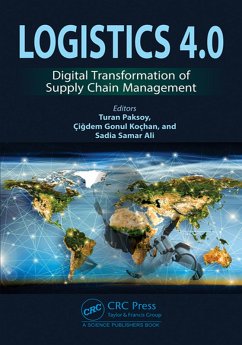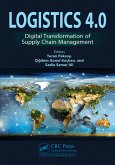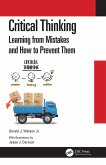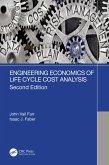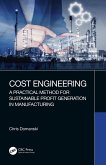Logistics 4.0 (eBook, ePUB)
Digital Transformation of Supply Chain Management
Redaktion: Paksoy, Turan; Ali, Sadia Samar; Kochan, Cigdem Gonul
72,95 €
72,95 €
inkl. MwSt.
Sofort per Download lieferbar

36 °P sammeln
72,95 €
Als Download kaufen

72,95 €
inkl. MwSt.
Sofort per Download lieferbar

36 °P sammeln
Jetzt verschenken
Alle Infos zum eBook verschenken
72,95 €
inkl. MwSt.
Sofort per Download lieferbar
Alle Infos zum eBook verschenken

36 °P sammeln
Logistics 4.0 (eBook, ePUB)
Digital Transformation of Supply Chain Management
Redaktion: Paksoy, Turan; Ali, Sadia Samar; Kochan, Cigdem Gonul
- Format: ePub
- Merkliste
- Auf die Merkliste
- Bewerten Bewerten
- Teilen
- Produkt teilen
- Produkterinnerung
- Produkterinnerung

Bitte loggen Sie sich zunächst in Ihr Kundenkonto ein oder registrieren Sie sich bei
bücher.de, um das eBook-Abo tolino select nutzen zu können.
Hier können Sie sich einloggen
Hier können Sie sich einloggen
Sie sind bereits eingeloggt. Klicken Sie auf 2. tolino select Abo, um fortzufahren.

Bitte loggen Sie sich zunächst in Ihr Kundenkonto ein oder registrieren Sie sich bei bücher.de, um das eBook-Abo tolino select nutzen zu können.
In this peer-reviewed book, experts from all over the world, in the field present a conceptual framework for Logistics 4.0 and provide examples for usage of Industry 4.0 tools in SCM. This book is a work that will be beneficial for both practitioners and students and academicians, as it covers the theoretical framework as well.
- Geräte: eReader
- ohne Kopierschutz
- eBook Hilfe
- Größe: 13.32MB
Andere Kunden interessierten sich auch für
![Facilities Design (eBook, ePUB) Facilities Design (eBook, ePUB)]() Sunderesh S. HeraguFacilities Design (eBook, ePUB)115,95 €
Sunderesh S. HeraguFacilities Design (eBook, ePUB)115,95 €![Logistics 4.0 (eBook, PDF) Logistics 4.0 (eBook, PDF)]() Logistics 4.0 (eBook, PDF)72,95 €
Logistics 4.0 (eBook, PDF)72,95 €![Critical Thinking (eBook, ePUB) Critical Thinking (eBook, ePUB)]() Gerald J. Watson Jr.Critical Thinking (eBook, ePUB)65,95 €
Gerald J. Watson Jr.Critical Thinking (eBook, ePUB)65,95 €![Engineering Economics of Life Cycle Cost Analysis (eBook, ePUB) Engineering Economics of Life Cycle Cost Analysis (eBook, ePUB)]() John Vail FarrEngineering Economics of Life Cycle Cost Analysis (eBook, ePUB)48,95 €
John Vail FarrEngineering Economics of Life Cycle Cost Analysis (eBook, ePUB)48,95 €![Design and Analysis of Closed-Loop Supply Chain Networks (eBook, ePUB) Design and Analysis of Closed-Loop Supply Chain Networks (eBook, ePUB)]() Subramanian PazhaniDesign and Analysis of Closed-Loop Supply Chain Networks (eBook, ePUB)20,95 €
Subramanian PazhaniDesign and Analysis of Closed-Loop Supply Chain Networks (eBook, ePUB)20,95 €![Cost Engineering (eBook, ePUB) Cost Engineering (eBook, ePUB)]() Chris DomanskiCost Engineering (eBook, ePUB)42,95 €
Chris DomanskiCost Engineering (eBook, ePUB)42,95 €![Facilities Design (eBook, PDF) Facilities Design (eBook, PDF)]() Sunderesh S. HeraguFacilities Design (eBook, PDF)115,95 €
Sunderesh S. HeraguFacilities Design (eBook, PDF)115,95 €-
-
-
In this peer-reviewed book, experts from all over the world, in the field present a conceptual framework for Logistics 4.0 and provide examples for usage of Industry 4.0 tools in SCM. This book is a work that will be beneficial for both practitioners and students and academicians, as it covers the theoretical framework as well.
Dieser Download kann aus rechtlichen Gründen nur mit Rechnungsadresse in A, B, BG, CY, CZ, D, DK, EW, E, FIN, F, GR, HR, H, IRL, I, LT, L, LR, M, NL, PL, P, R, S, SLO, SK ausgeliefert werden.
Produktdetails
- Produktdetails
- Verlag: Taylor & Francis eBooks
- Seitenzahl: 368
- Erscheinungstermin: 17. Dezember 2020
- Englisch
- ISBN-13: 9781000245165
- Artikelnr.: 60755968
- Verlag: Taylor & Francis eBooks
- Seitenzahl: 368
- Erscheinungstermin: 17. Dezember 2020
- Englisch
- ISBN-13: 9781000245165
- Artikelnr.: 60755968
- Herstellerkennzeichnung Die Herstellerinformationen sind derzeit nicht verfügbar.
Dr. Turan Paksoy received his B.S. degree in industrial engineering from Gazi University, M.S. degree in industrial engineering, and PhD degree in production management from Selçuk University in 2004. He received the associate's degree in production management in 2008 from National Academic Council of Turkey. In 2015, he was promoted to full professor at Selçuk University. Dr. Paksoy currently is working as a faculty member at Konya Technical University, Department of Industrial Engineering. He attended London Kingston University as visiting professor in 2015. Dr. Paksoy also has the affiliation of founding director of KTO Karatay University Lean & Green SCM Lab. He has been honored with being chosen for "Global Sustainable Leaders" by U.S. Green Chamber of Commerce in 2018. Dr. Cigdem Gonul Kochan earned her Ph.D. degree in Logistics and Supply Chain Management from the University of North Texas. Her research focusses on the intersection of supply chain resilience, supply chain technologies, and healthcare supply chains. Her research has been published in the International Journal of Production Economics, International Journal of Physical Distribution and Logistics Management, and International Journal of Logistics Management. She currently serves as an Assistant Professor at Northeastern Illinois University. Dr. Sadia Samar Ali She is a professor at Dept of Industrial Engg, King Abdul-Aziz University Jeddah. She is both an academician and researcher contributing value towards working for bridging the gaps between academia and industry in the growth of nation's young future managers by exposing them to apply Statistical Analysis on real situation. Dr. Ali is a registered guide in the area of Statistics and Management and has been mentoring aspiring scholars to polish their research methods skill. In addition to academic pursuits she takes keen interest in publications also. Dr. Ali has published more than 60 papers listed in ISI, SCI/SSCI ,SCOPUS and SCIRUSindexed which have appeared in leading European, American, Indian and South-Asian journals.
SECTION 1: INTRODUCTION AND CONCEPTUAL FRAMEWORK. A Conceptual Framework
for Industry 4.0 (How is it started, how is it evolving over time?).
Logistics 4.0: Changing Patterns of Logistics in Industry 4.0 and Role of
Digital Transformation in SCM. SECTION 2: INTERNET OF THINGS AND
CYBER-PHYSICAL SYSTEMS IN SCM. The Internet of Things in Supply Chain
Management. The Impact of Internet of Things on Supply Chain 4.0: A Review
and Bibliometric Analysis. The New Challenge of Industry 4.0: Sustainable
Supply Chain Network Design with Internet of Things. SECTION 3: FUZZY
DECISION MAKING IN SCM. Fuzzy Logic and Fuzzy Decision Making in SCM: Fuzzy
Multi Criteria Decision Making for Supplier Selection. SECTION 4: MACHINE
LEARNING IN SCM. Supplier Selection with Machine Learning Algorithms. Deep
Learning for Prediction of Bus Arrival Time in Public Transportation.
SECTION 5: AUGMENTED REALITY IN SCM. Augmented Reality in Supply Chain
Management. SECTION 6: BLOCKCHAIN IN SCM: THE IMPACT OF BLOCK CHAIN
TECHNOLOGY FOR SCM- POTENTIALS, PROMISES, AND FUTURE DIRECTIONS. Blockchain
Driven Supply Chain Management: The Application Potential of Blockchain
Technology in Supply Chain and Logistics. SECTION 7: AI, ROBOTICS AND
AUTONOMOUS SYSTEMS IN SCM. Artificial Intelligence, Robotics and Autonomous
Systems in SCM. SECTION 8: SMART FACTORIES: TRANSFORMATION OF PRODUCTION
AND INVENTORY MANAGEMENT. Smart Factories: Integrated Disassembly Line
Balancing and Routing Problem with 3D Printers. Enterprise Resource
Planning in the Age of Industry 4.0: A General Overview. Smart Warehouses
in Logistics 4.0. SECTION 9: SMART OPERATIONS MANAGEMENT. Comparison of
integrated and sequential decisions on production and distribution
activities: New mathematical models. Profit Oriented Balancing of Parallel
Disassembly Lines with Processing Alternatives in the Age of 4.0. SECTION
10: MATURITY MODELS AND ANALYSIS FOR INDUSTRY 4.0 AND LOGISTICS 4.0. A
Study of Maturity Model for Assessing the Logistics 4.0 Transformation
Level of Industrial Enterprises: Literature Review and a Draft Model
Proposal. SECTION 11: SMART AND SUSTAINABLE/GREEN SCM. Smart and
Sustainable Supply Chain Management In Industry 4.0. A Content Analysis for
Sustainable Supply Chain Management Based on Industry 4.0. A New Collecting
and Management Proposal under Logistics 4.0 and Green Concept. SECTION 12:
MANAGEMENT OF DIGITAL TRANSFORMATION IN SCM. The Roles of Human 4.0 in the
Industry 4.0 Phenomenon. Lean Manufacturing and Industry 4.0: A framework
to integrate the two paradigms.
for Industry 4.0 (How is it started, how is it evolving over time?).
Logistics 4.0: Changing Patterns of Logistics in Industry 4.0 and Role of
Digital Transformation in SCM. SECTION 2: INTERNET OF THINGS AND
CYBER-PHYSICAL SYSTEMS IN SCM. The Internet of Things in Supply Chain
Management. The Impact of Internet of Things on Supply Chain 4.0: A Review
and Bibliometric Analysis. The New Challenge of Industry 4.0: Sustainable
Supply Chain Network Design with Internet of Things. SECTION 3: FUZZY
DECISION MAKING IN SCM. Fuzzy Logic and Fuzzy Decision Making in SCM: Fuzzy
Multi Criteria Decision Making for Supplier Selection. SECTION 4: MACHINE
LEARNING IN SCM. Supplier Selection with Machine Learning Algorithms. Deep
Learning for Prediction of Bus Arrival Time in Public Transportation.
SECTION 5: AUGMENTED REALITY IN SCM. Augmented Reality in Supply Chain
Management. SECTION 6: BLOCKCHAIN IN SCM: THE IMPACT OF BLOCK CHAIN
TECHNOLOGY FOR SCM- POTENTIALS, PROMISES, AND FUTURE DIRECTIONS. Blockchain
Driven Supply Chain Management: The Application Potential of Blockchain
Technology in Supply Chain and Logistics. SECTION 7: AI, ROBOTICS AND
AUTONOMOUS SYSTEMS IN SCM. Artificial Intelligence, Robotics and Autonomous
Systems in SCM. SECTION 8: SMART FACTORIES: TRANSFORMATION OF PRODUCTION
AND INVENTORY MANAGEMENT. Smart Factories: Integrated Disassembly Line
Balancing and Routing Problem with 3D Printers. Enterprise Resource
Planning in the Age of Industry 4.0: A General Overview. Smart Warehouses
in Logistics 4.0. SECTION 9: SMART OPERATIONS MANAGEMENT. Comparison of
integrated and sequential decisions on production and distribution
activities: New mathematical models. Profit Oriented Balancing of Parallel
Disassembly Lines with Processing Alternatives in the Age of 4.0. SECTION
10: MATURITY MODELS AND ANALYSIS FOR INDUSTRY 4.0 AND LOGISTICS 4.0. A
Study of Maturity Model for Assessing the Logistics 4.0 Transformation
Level of Industrial Enterprises: Literature Review and a Draft Model
Proposal. SECTION 11: SMART AND SUSTAINABLE/GREEN SCM. Smart and
Sustainable Supply Chain Management In Industry 4.0. A Content Analysis for
Sustainable Supply Chain Management Based on Industry 4.0. A New Collecting
and Management Proposal under Logistics 4.0 and Green Concept. SECTION 12:
MANAGEMENT OF DIGITAL TRANSFORMATION IN SCM. The Roles of Human 4.0 in the
Industry 4.0 Phenomenon. Lean Manufacturing and Industry 4.0: A framework
to integrate the two paradigms.
SECTION 1: INTRODUCTION AND CONCEPTUAL FRAMEWORK. A Conceptual Framework
for Industry 4.0 (How is it started, how is it evolving over time?).
Logistics 4.0: Changing Patterns of Logistics in Industry 4.0 and Role of
Digital Transformation in SCM. SECTION 2: INTERNET OF THINGS AND
CYBER-PHYSICAL SYSTEMS IN SCM. The Internet of Things in Supply Chain
Management. The Impact of Internet of Things on Supply Chain 4.0: A Review
and Bibliometric Analysis. The New Challenge of Industry 4.0: Sustainable
Supply Chain Network Design with Internet of Things. SECTION 3: FUZZY
DECISION MAKING IN SCM. Fuzzy Logic and Fuzzy Decision Making in SCM: Fuzzy
Multi Criteria Decision Making for Supplier Selection. SECTION 4: MACHINE
LEARNING IN SCM. Supplier Selection with Machine Learning Algorithms. Deep
Learning for Prediction of Bus Arrival Time in Public Transportation.
SECTION 5: AUGMENTED REALITY IN SCM. Augmented Reality in Supply Chain
Management. SECTION 6: BLOCKCHAIN IN SCM: THE IMPACT OF BLOCK CHAIN
TECHNOLOGY FOR SCM- POTENTIALS, PROMISES, AND FUTURE DIRECTIONS. Blockchain
Driven Supply Chain Management: The Application Potential of Blockchain
Technology in Supply Chain and Logistics. SECTION 7: AI, ROBOTICS AND
AUTONOMOUS SYSTEMS IN SCM. Artificial Intelligence, Robotics and Autonomous
Systems in SCM. SECTION 8: SMART FACTORIES: TRANSFORMATION OF PRODUCTION
AND INVENTORY MANAGEMENT. Smart Factories: Integrated Disassembly Line
Balancing and Routing Problem with 3D Printers. Enterprise Resource
Planning in the Age of Industry 4.0: A General Overview. Smart Warehouses
in Logistics 4.0. SECTION 9: SMART OPERATIONS MANAGEMENT. Comparison of
integrated and sequential decisions on production and distribution
activities: New mathematical models. Profit Oriented Balancing of Parallel
Disassembly Lines with Processing Alternatives in the Age of 4.0. SECTION
10: MATURITY MODELS AND ANALYSIS FOR INDUSTRY 4.0 AND LOGISTICS 4.0. A
Study of Maturity Model for Assessing the Logistics 4.0 Transformation
Level of Industrial Enterprises: Literature Review and a Draft Model
Proposal. SECTION 11: SMART AND SUSTAINABLE/GREEN SCM. Smart and
Sustainable Supply Chain Management In Industry 4.0. A Content Analysis for
Sustainable Supply Chain Management Based on Industry 4.0. A New Collecting
and Management Proposal under Logistics 4.0 and Green Concept. SECTION 12:
MANAGEMENT OF DIGITAL TRANSFORMATION IN SCM. The Roles of Human 4.0 in the
Industry 4.0 Phenomenon. Lean Manufacturing and Industry 4.0: A framework
to integrate the two paradigms.
for Industry 4.0 (How is it started, how is it evolving over time?).
Logistics 4.0: Changing Patterns of Logistics in Industry 4.0 and Role of
Digital Transformation in SCM. SECTION 2: INTERNET OF THINGS AND
CYBER-PHYSICAL SYSTEMS IN SCM. The Internet of Things in Supply Chain
Management. The Impact of Internet of Things on Supply Chain 4.0: A Review
and Bibliometric Analysis. The New Challenge of Industry 4.0: Sustainable
Supply Chain Network Design with Internet of Things. SECTION 3: FUZZY
DECISION MAKING IN SCM. Fuzzy Logic and Fuzzy Decision Making in SCM: Fuzzy
Multi Criteria Decision Making for Supplier Selection. SECTION 4: MACHINE
LEARNING IN SCM. Supplier Selection with Machine Learning Algorithms. Deep
Learning for Prediction of Bus Arrival Time in Public Transportation.
SECTION 5: AUGMENTED REALITY IN SCM. Augmented Reality in Supply Chain
Management. SECTION 6: BLOCKCHAIN IN SCM: THE IMPACT OF BLOCK CHAIN
TECHNOLOGY FOR SCM- POTENTIALS, PROMISES, AND FUTURE DIRECTIONS. Blockchain
Driven Supply Chain Management: The Application Potential of Blockchain
Technology in Supply Chain and Logistics. SECTION 7: AI, ROBOTICS AND
AUTONOMOUS SYSTEMS IN SCM. Artificial Intelligence, Robotics and Autonomous
Systems in SCM. SECTION 8: SMART FACTORIES: TRANSFORMATION OF PRODUCTION
AND INVENTORY MANAGEMENT. Smart Factories: Integrated Disassembly Line
Balancing and Routing Problem with 3D Printers. Enterprise Resource
Planning in the Age of Industry 4.0: A General Overview. Smart Warehouses
in Logistics 4.0. SECTION 9: SMART OPERATIONS MANAGEMENT. Comparison of
integrated and sequential decisions on production and distribution
activities: New mathematical models. Profit Oriented Balancing of Parallel
Disassembly Lines with Processing Alternatives in the Age of 4.0. SECTION
10: MATURITY MODELS AND ANALYSIS FOR INDUSTRY 4.0 AND LOGISTICS 4.0. A
Study of Maturity Model for Assessing the Logistics 4.0 Transformation
Level of Industrial Enterprises: Literature Review and a Draft Model
Proposal. SECTION 11: SMART AND SUSTAINABLE/GREEN SCM. Smart and
Sustainable Supply Chain Management In Industry 4.0. A Content Analysis for
Sustainable Supply Chain Management Based on Industry 4.0. A New Collecting
and Management Proposal under Logistics 4.0 and Green Concept. SECTION 12:
MANAGEMENT OF DIGITAL TRANSFORMATION IN SCM. The Roles of Human 4.0 in the
Industry 4.0 Phenomenon. Lean Manufacturing and Industry 4.0: A framework
to integrate the two paradigms.
